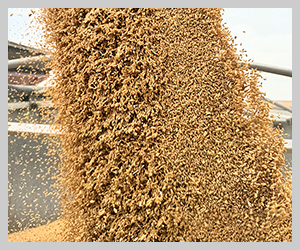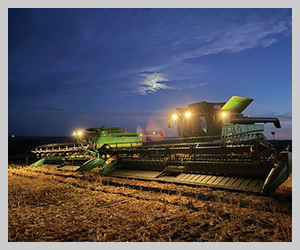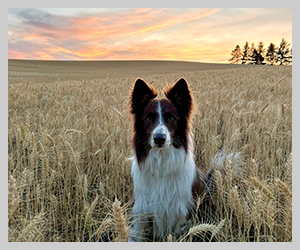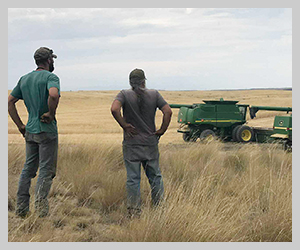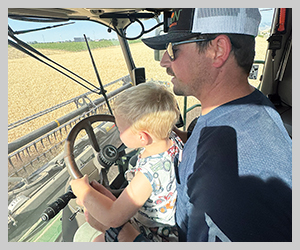Market intelligence Convention speaker will look at commodities' macro-economic picture
2025November 2025
By Trista Crossley
Editor

In early October, when Wheat Life spoke to Arlan Suderman, it was too early for him to know exactly what he’ll be talking about at the convention later this month. In fact, depending on world headlines, he might be putting the pieces together at the very last minute so growers have the most up-to-date information they need to make smart marketing decisions.
“I do daily commentary twice a day, and there have been times when I’ve had to change my commentary three times before hitting the publish button because the headlines kept changing it,” Suderman said. “I can tell you that we’ll be looking at the larger macro-economic picture in this tariff world that we live in, in Trump policy and how that’s impacting commodities, and then narrow down more specifically to the wheat sector. And between now and then, we will get a Supreme Court decision on the legality of President Trump’s tariffs, and that could change everything, some positive, some negative.”
Suderman is the chief commodities economist for the StoneX Group, a financial services provider for global markets. He oversees the company’s commodity market intelligence efforts, providing market insights on global macro-economic trends and their implications for the commodity markets. Suderman is scheduled to be the breakfast speaker on Wednesday, Nov. 19, at the 2025 Washington Grain Growers Convention at the Coeur d’Alene Resort in Coeur d’Alene, Idaho. Growers can register for the convention at grainconvention.com.
Suderman grew up on a small south central Kansas wheat farm that included sheep and hogs. He started his career as an agronomist, but got interested in the markets when his growers started asking marketing questions. He noticed that the commentary out of Chicago about why the markets went up or down didn’t always seem to fit with the day’s price action, so he started studying connections between the grain and oilseed markets and other financial markets. His focus eventually landed on macro-economic trends and emerging geopolitical risks, and how they influence the commodity markets.
“The markets always manage supply and demand. That’s their job,” he explained. “In times of surplus, you take prices down to stimulate demand and discourage production, and when you have short supplies, prices go up to stimulate production and ration demand. Identifying those bigger trends that are influencing money flow and identifying how those levels are changing has a big impact on what we can anticipate from marketing opportunities all the way to the farm gate.”
When giving advice to growers, Suderman said it’s important to recognize where we are in the cycle. For the past year, he’s been sounding the warning that the agricultural industry is entering a period where farmers need to be defensive in their marketing. Growers should focus on getting the price they need to protect their equity in the farm, rather than getting the highest price possible, because there’s more downside price risk than upside price risk right now.
“I’ve been in this business for more than four decades, and these cycles can last for multiple years, so it’s important that we go in a little bit more of a survival mode and maybe accept prices at times that we don’t like, but that help make sure that we’re still in business a year from now,” he said.
Suderman also advises growers against making decisions based on what they see on social media, because “social media is always full of people selling their services, and for that, they need to get the farmers’ attention. They’re always building bullish cases of why prices are going to be surging.” That can give growers a false sense of security that better prices lie ahead when the fundamentals don’t necessarily support them.
Some of the world events Suderman has been tracking in the past year include:
- The war in the Black Sea region.
- The crisis in the Red Sea region that is impacting traffic through the Suez Canal.
- Tensions with China, which is the world’s largest commodity importer.
- The development of agriculture in Brazil, combined with a break in their currency, that has made them very competitive and challenging for U.S. agriculture.
- The advent of artificial intelligence, and how that can open doors but also presents risks.
Suderman does twice daily commentary and says his day begins with reading updates on U.S. trade or other policy news, scanning global headlines to see what might impact commodities, getting a daily wire from an employee in Shanghai, and looking at the weather in major commodity-producing countries. He uses those bits of information to puzzle out a picture of what’s impacting that day’s markets — a picture that can change with very little warning.
“That’s the world that we live in today, where the picture is constantly changing. You have to change your strategy in putting the puzzle pieces together, constantly interpreting it how it changes the picture,” he said.
Read Suderman’s commentary at stonex.com/en/thought-leadership/market-experts/arlan-suderman/. He can also be found on X (Twitter) at @ArlanFF101.






